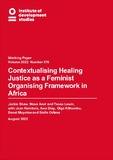Contextualising Healing Justice as a Feminist Organising Framework in Africa
| dc.contributor.author | Shaw, Jacqueline | |
| dc.contributor.author | Amir, Masa | |
| dc.contributor.author | Lewin, Tessa | |
| dc.contributor.author | Kemitare, Jean | |
| dc.contributor.author | Diop, Awa | |
| dc.contributor.author | Kithumbu, Olga | |
| dc.contributor.author | Mupotsa, Danai | |
| dc.contributor.author | Odiase, Stella | |
| dc.coverage.spatial | Democratic Republic of the Congo | en |
| dc.coverage.spatial | Senegal | en |
| dc.coverage.spatial | South Africa | en |
| dc.date.accessioned | 2022-08-16T13:41:59Z | |
| dc.date.available | 2022-08-16T13:41:59Z | |
| dc.date.issued | 2022-08-16 | |
| dc.identifier.citation | Shaw, J.; Amir, M. and Lewin, T., with Kemitare, J.; Diop, A.; Kithumbu, O.; Mupotsa, D. and Odiase, S. (2022) Contextualising Healing Justice as a Feminist Organising Framework in Africa, IDS Working Paper 576, Brighton: Institute of Development Studies, DOI: 10.19088/IDS.2022.063 | en |
| dc.identifier.isbn | 978-1-80470-028-0 | |
| dc.identifier.issn | 2040-0209 | |
| dc.identifier.uri | https://opendocs.ids.ac.uk/opendocs/handle/20.500.12413/17599 | |
| dc.description.abstract | Healing justice is a political organising framework that aims to address the systemic causes of injustice experienced by marginalised peoples due to the harmful impacts of oppressive histories, intergenerational trauma, and structural violence. It recognises that these damaging factors generate collective trauma, which manifests in negative physical, mental–emotional, and spiritual effects in activists and in the functioning of their movements. Healing justice integrates collective healing in political organising processes, and is contextualised as appropriate to situational needs. This provided the rationale for a research study to explore the potential of healing justice for feminist activists in Africa, and how pathways to collective healing could be supported in specific contexts. Research teams in DRC, Senegal, and South Africa conducted interviews with feminist activists and healers, in addition to supplementary interviews across sub-regions of Africa and two learning events with wider stakeholders. This working paper presents a provisional healing justice framework grounded in relationship to various feminist activism contexts in Africa. We present insights on the everyday impacts of injustice and trauma experienced by African feminist activists and healers in the study, a range of healing and organising elements and practices that could be sequenced and layered towards collective healing aims, and how feminist organising might be enhanced through shifting the structures, dynamics, and support for feminist organisations. Overall, we suggest that it is critical to explore the roots of collective trauma and harm, and prioritise collective healing within feminist struggles towards justice and liberation. | en |
| dc.description.sponsorship | Urgent Action Fund-Africa (UAF-Africa) | en |
| dc.language.iso | en | en |
| dc.publisher | Institute of Development Studies | en |
| dc.relation.ispartofseries | IDS Working Paper;576 | |
| dc.rights | This is an Open Access paper distributed under the terms of the Creative Commons Attribution 4.0 International licence (CC BY), which permits unrestricted use, distribution, and reproduction in any medium, provided the original authors and source are credited and any modifications or adaptations are indicated. | en |
| dc.rights.uri | http://creativecommons.org/licenses/by/4.0/ | en |
| dc.subject | Gender | en |
| dc.subject | Participation | en |
| dc.subject | Sexuality and Development | en |
| dc.title | Contextualising Healing Justice as a Feminist Organising Framework in Africa | en |
| dc.type | IDS Working Paper | en |
| dc.rights.holder | Institute of Development Studies | en |
| dc.identifier.team | Participation | en |
| dc.identifier.doi | 10.19088/IDS.2022.063 | |
| dcterms.dateAccepted | 2022-08-16 | |
| rioxxterms.funder | Default funder | en |
| rioxxterms.identifier.project | Default project | en |
| rioxxterms.version | VoR | en |
| rioxxterms.versionofrecord | 10.19088/IDS.2022.063 | en |
| rioxxterms.funder.project | 9ce4e4dc-26e9-4d78-96e9-15e4dcac0642 | en |
Files in this item
This item appears in the following Collection(s)
-
IDS Research [1671]
Except where otherwise noted, this item's license is described as This is an Open Access paper distributed under the terms of the Creative Commons Attribution 4.0 International licence (CC BY), which permits unrestricted use, distribution, and reproduction in any medium, provided the original authors and source are credited and any modifications or adaptations are indicated.


